MGT5PLS: Project Manager Leadership Report, Reflective Analysis
VerifiedAdded on 2022/09/28
|6
|937
|29
Report
AI Summary
This report delves into the crucial role of project manager leadership, examining how different leadership styles are essential for navigating various project life cycle stages. It emphasizes the significance of leadership in fostering project success and highlights the evolution of leadership styles as projects progress. The report explores ethical leadership theories, focusing on the importance of a leader's actions, behaviors, characteristics, and personalities. It discusses the ethical responsibilities of a project manager, including respecting team members, serving others, ensuring justice, building community, and maintaining honesty. The report references key academic sources to support its analysis, providing a comprehensive overview of effective and ethical project management practices.
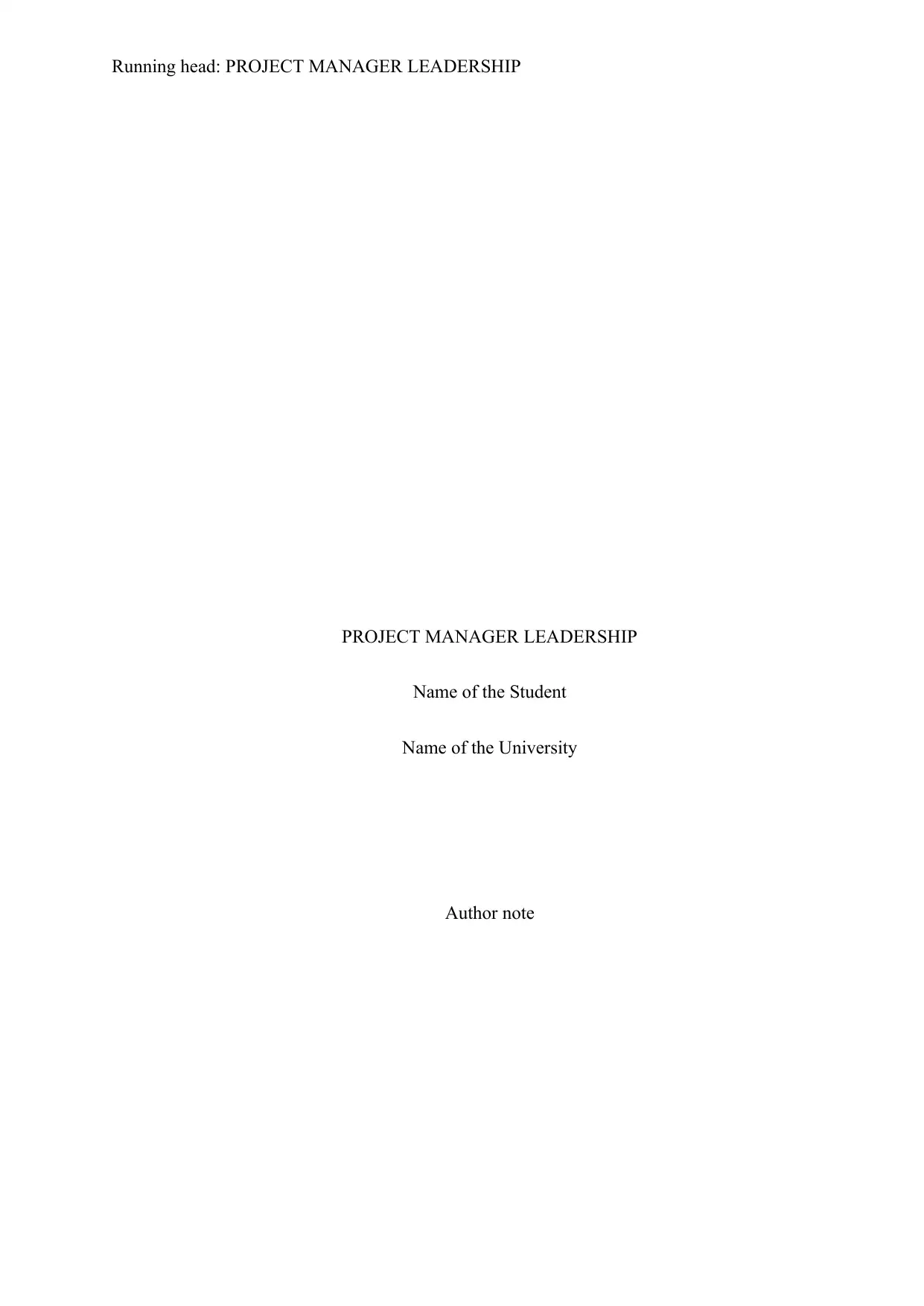
Running head: PROJECT MANAGER LEADERSHIP
PROJECT MANAGER LEADERSHIP
Name of the Student
Name of the University
Author note
PROJECT MANAGER LEADERSHIP
Name of the Student
Name of the University
Author note
Paraphrase This Document
Need a fresh take? Get an instant paraphrase of this document with our AI Paraphraser
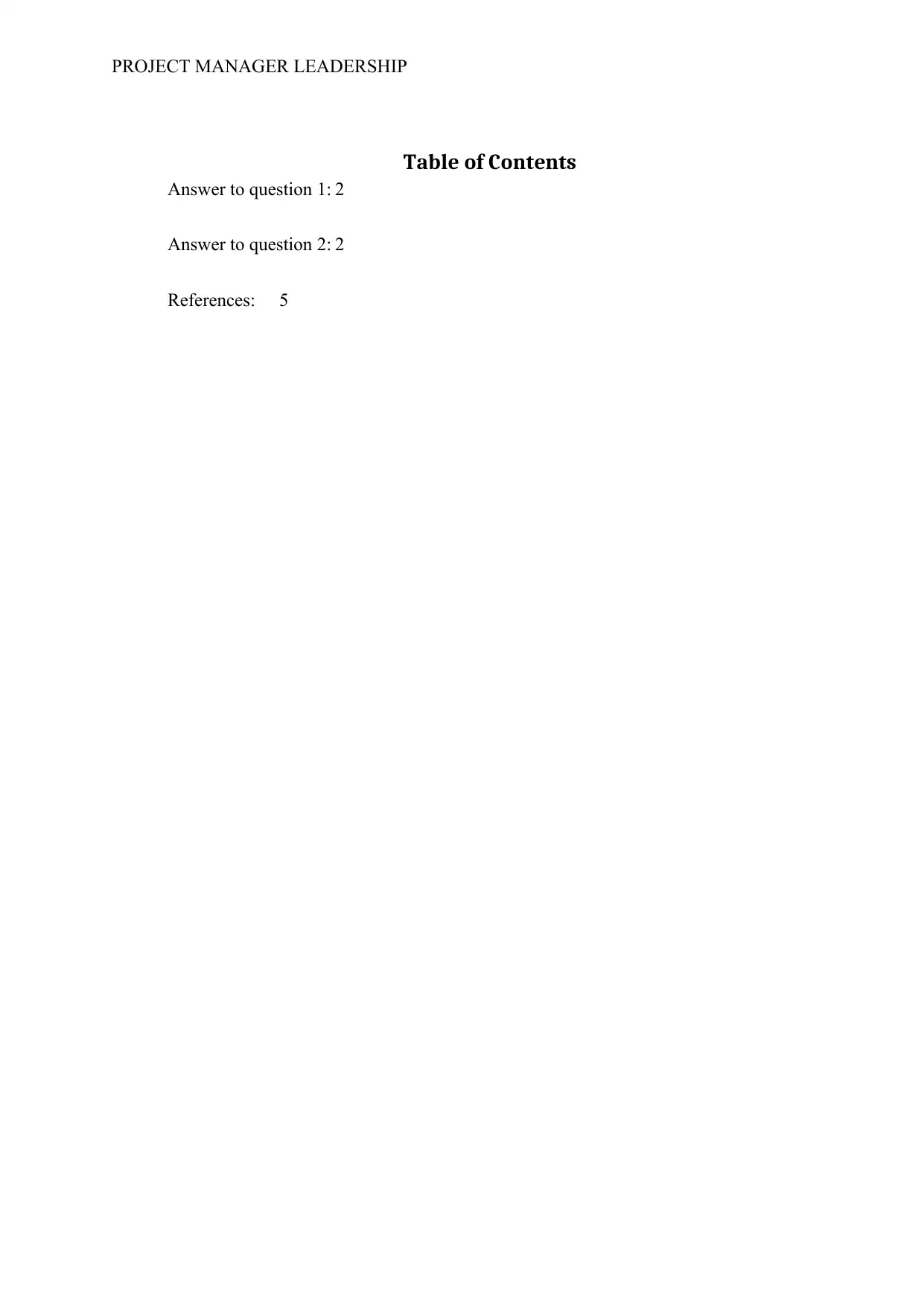
PROJECT MANAGER LEADERSHIP
Table of Contents
Answer to question 1: 2
Answer to question 2: 2
References: 5
Table of Contents
Answer to question 1: 2
Answer to question 2: 2
References: 5
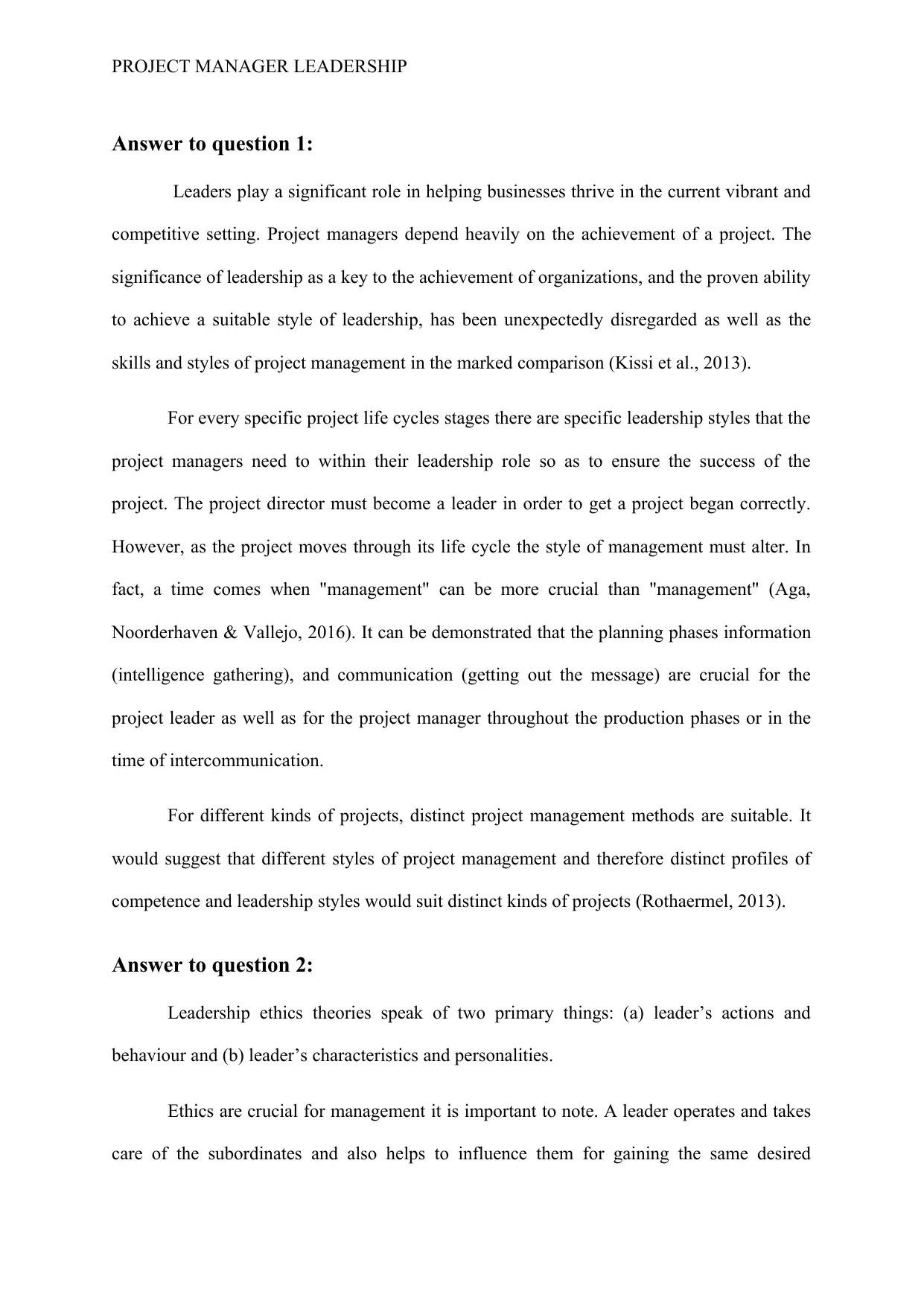
PROJECT MANAGER LEADERSHIP
Answer to question 1:
Leaders play a significant role in helping businesses thrive in the current vibrant and
competitive setting. Project managers depend heavily on the achievement of a project. The
significance of leadership as a key to the achievement of organizations, and the proven ability
to achieve a suitable style of leadership, has been unexpectedly disregarded as well as the
skills and styles of project management in the marked comparison (Kissi et al., 2013).
For every specific project life cycles stages there are specific leadership styles that the
project managers need to within their leadership role so as to ensure the success of the
project. The project director must become a leader in order to get a project began correctly.
However, as the project moves through its life cycle the style of management must alter. In
fact, a time comes when "management" can be more crucial than "management" (Aga,
Noorderhaven & Vallejo, 2016). It can be demonstrated that the planning phases information
(intelligence gathering), and communication (getting out the message) are crucial for the
project leader as well as for the project manager throughout the production phases or in the
time of intercommunication.
For different kinds of projects, distinct project management methods are suitable. It
would suggest that different styles of project management and therefore distinct profiles of
competence and leadership styles would suit distinct kinds of projects (Rothaermel, 2013).
Answer to question 2:
Leadership ethics theories speak of two primary things: (a) leader’s actions and
behaviour and (b) leader’s characteristics and personalities.
Ethics are crucial for management it is important to note. A leader operates and takes
care of the subordinates and also helps to influence them for gaining the same desired
Answer to question 1:
Leaders play a significant role in helping businesses thrive in the current vibrant and
competitive setting. Project managers depend heavily on the achievement of a project. The
significance of leadership as a key to the achievement of organizations, and the proven ability
to achieve a suitable style of leadership, has been unexpectedly disregarded as well as the
skills and styles of project management in the marked comparison (Kissi et al., 2013).
For every specific project life cycles stages there are specific leadership styles that the
project managers need to within their leadership role so as to ensure the success of the
project. The project director must become a leader in order to get a project began correctly.
However, as the project moves through its life cycle the style of management must alter. In
fact, a time comes when "management" can be more crucial than "management" (Aga,
Noorderhaven & Vallejo, 2016). It can be demonstrated that the planning phases information
(intelligence gathering), and communication (getting out the message) are crucial for the
project leader as well as for the project manager throughout the production phases or in the
time of intercommunication.
For different kinds of projects, distinct project management methods are suitable. It
would suggest that different styles of project management and therefore distinct profiles of
competence and leadership styles would suit distinct kinds of projects (Rothaermel, 2013).
Answer to question 2:
Leadership ethics theories speak of two primary things: (a) leader’s actions and
behaviour and (b) leader’s characteristics and personalities.
Ethics are crucial for management it is important to note. A leader operates and takes
care of the subordinates and also helps to influence them for gaining the same desired
⊘ This is a preview!⊘
Do you want full access?
Subscribe today to unlock all pages.

Trusted by 1+ million students worldwide
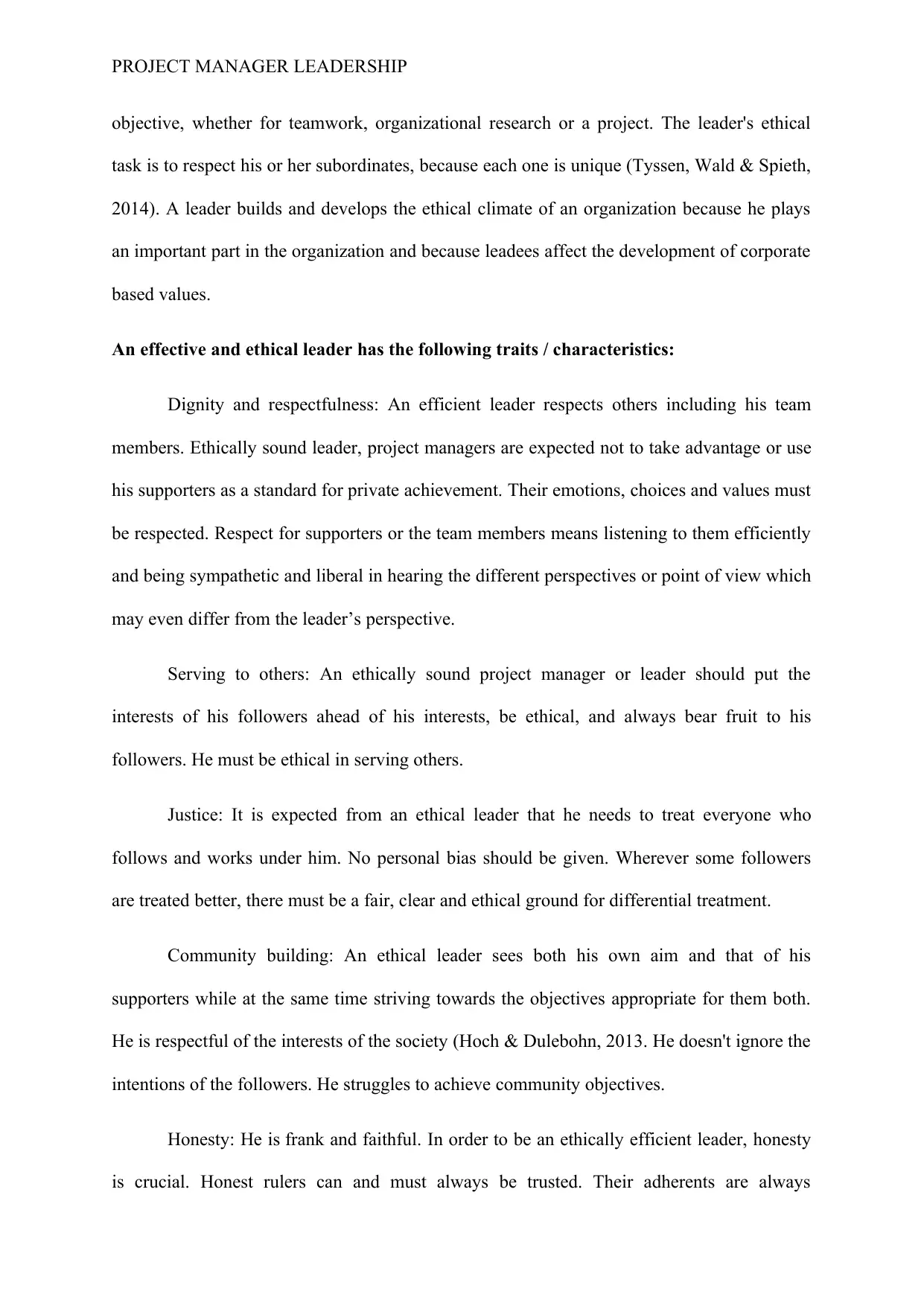
PROJECT MANAGER LEADERSHIP
objective, whether for teamwork, organizational research or a project. The leader's ethical
task is to respect his or her subordinates, because each one is unique (Tyssen, Wald & Spieth,
2014). A leader builds and develops the ethical climate of an organization because he plays
an important part in the organization and because leadees affect the development of corporate
based values.
An effective and ethical leader has the following traits / characteristics:
Dignity and respectfulness: An efficient leader respects others including his team
members. Ethically sound leader, project managers are expected not to take advantage or use
his supporters as a standard for private achievement. Their emotions, choices and values must
be respected. Respect for supporters or the team members means listening to them efficiently
and being sympathetic and liberal in hearing the different perspectives or point of view which
may even differ from the leader’s perspective.
Serving to others: An ethically sound project manager or leader should put the
interests of his followers ahead of his interests, be ethical, and always bear fruit to his
followers. He must be ethical in serving others.
Justice: It is expected from an ethical leader that he needs to treat everyone who
follows and works under him. No personal bias should be given. Wherever some followers
are treated better, there must be a fair, clear and ethical ground for differential treatment.
Community building: An ethical leader sees both his own aim and that of his
supporters while at the same time striving towards the objectives appropriate for them both.
He is respectful of the interests of the society (Hoch & Dulebohn, 2013. He doesn't ignore the
intentions of the followers. He struggles to achieve community objectives.
Honesty: He is frank and faithful. In order to be an ethically efficient leader, honesty
is crucial. Honest rulers can and must always be trusted. Their adherents are always
objective, whether for teamwork, organizational research or a project. The leader's ethical
task is to respect his or her subordinates, because each one is unique (Tyssen, Wald & Spieth,
2014). A leader builds and develops the ethical climate of an organization because he plays
an important part in the organization and because leadees affect the development of corporate
based values.
An effective and ethical leader has the following traits / characteristics:
Dignity and respectfulness: An efficient leader respects others including his team
members. Ethically sound leader, project managers are expected not to take advantage or use
his supporters as a standard for private achievement. Their emotions, choices and values must
be respected. Respect for supporters or the team members means listening to them efficiently
and being sympathetic and liberal in hearing the different perspectives or point of view which
may even differ from the leader’s perspective.
Serving to others: An ethically sound project manager or leader should put the
interests of his followers ahead of his interests, be ethical, and always bear fruit to his
followers. He must be ethical in serving others.
Justice: It is expected from an ethical leader that he needs to treat everyone who
follows and works under him. No personal bias should be given. Wherever some followers
are treated better, there must be a fair, clear and ethical ground for differential treatment.
Community building: An ethical leader sees both his own aim and that of his
supporters while at the same time striving towards the objectives appropriate for them both.
He is respectful of the interests of the society (Hoch & Dulebohn, 2013. He doesn't ignore the
intentions of the followers. He struggles to achieve community objectives.
Honesty: He is frank and faithful. In order to be an ethically efficient leader, honesty
is crucial. Honest rulers can and must always be trusted. Their adherents are always
Paraphrase This Document
Need a fresh take? Get an instant paraphrase of this document with our AI Paraphraser

PROJECT MANAGER LEADERSHIP
respected. An honest leader genuinely and fully introduces the facts and conditions regardless
of how critical and detrimental the situation is.
respected. An honest leader genuinely and fully introduces the facts and conditions regardless
of how critical and detrimental the situation is.
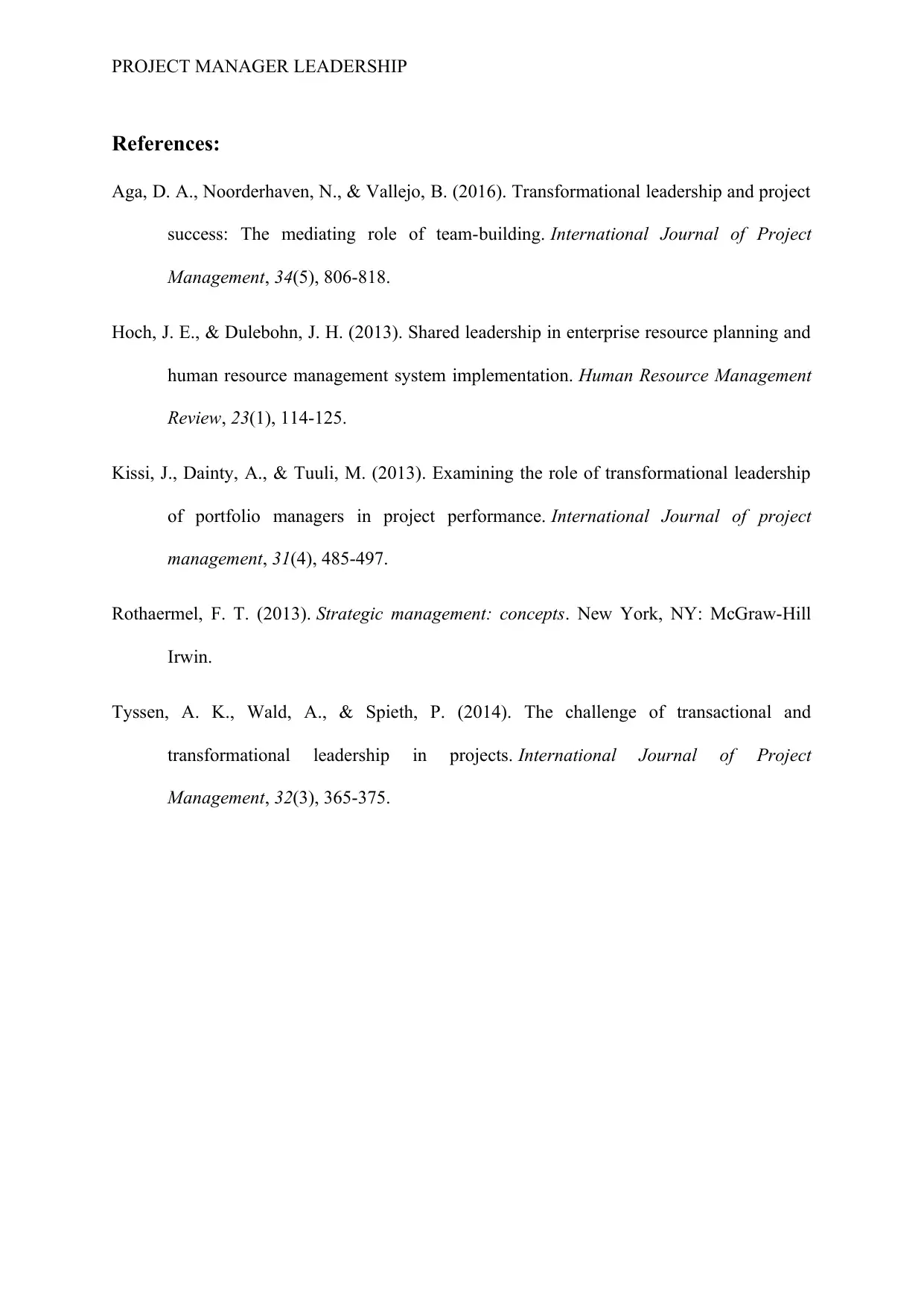
PROJECT MANAGER LEADERSHIP
References:
Aga, D. A., Noorderhaven, N., & Vallejo, B. (2016). Transformational leadership and project
success: The mediating role of team-building. International Journal of Project
Management, 34(5), 806-818.
Hoch, J. E., & Dulebohn, J. H. (2013). Shared leadership in enterprise resource planning and
human resource management system implementation. Human Resource Management
Review, 23(1), 114-125.
Kissi, J., Dainty, A., & Tuuli, M. (2013). Examining the role of transformational leadership
of portfolio managers in project performance. International Journal of project
management, 31(4), 485-497.
Rothaermel, F. T. (2013). Strategic management: concepts. New York, NY: McGraw-Hill
Irwin.
Tyssen, A. K., Wald, A., & Spieth, P. (2014). The challenge of transactional and
transformational leadership in projects. International Journal of Project
Management, 32(3), 365-375.
References:
Aga, D. A., Noorderhaven, N., & Vallejo, B. (2016). Transformational leadership and project
success: The mediating role of team-building. International Journal of Project
Management, 34(5), 806-818.
Hoch, J. E., & Dulebohn, J. H. (2013). Shared leadership in enterprise resource planning and
human resource management system implementation. Human Resource Management
Review, 23(1), 114-125.
Kissi, J., Dainty, A., & Tuuli, M. (2013). Examining the role of transformational leadership
of portfolio managers in project performance. International Journal of project
management, 31(4), 485-497.
Rothaermel, F. T. (2013). Strategic management: concepts. New York, NY: McGraw-Hill
Irwin.
Tyssen, A. K., Wald, A., & Spieth, P. (2014). The challenge of transactional and
transformational leadership in projects. International Journal of Project
Management, 32(3), 365-375.
⊘ This is a preview!⊘
Do you want full access?
Subscribe today to unlock all pages.

Trusted by 1+ million students worldwide
1 out of 6
Related Documents
Your All-in-One AI-Powered Toolkit for Academic Success.
+13062052269
info@desklib.com
Available 24*7 on WhatsApp / Email
![[object Object]](/_next/static/media/star-bottom.7253800d.svg)
Unlock your academic potential
Copyright © 2020–2026 A2Z Services. All Rights Reserved. Developed and managed by ZUCOL.




